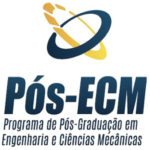All Courses
Área de Materiais
ECM410006 – Science of Materials
Required: yes
Total Class Hours: 45
Credits: 3
Description: Foundations of the solid state of materials. Properties and Processing of Metallic Materials. Properties and Processing of Ceramic Materials. Properties and Processing of Polymeric Materials. Properties and Processing of Composite Materials.
ECM410075 – Seminários de Pesquisa Científica e Tecnológica em Materiais
Required: yes
Total Class Hours: 45
Credits: 3
Ementa: Introdução aos avanços científicos e tecnológicos da área de concentração materiais no contexto de Engenharia e Ciências Mecânicas. Capacitação em técnicas de apresentação e no preparo de seminários. Integração de metodologias experimentais e teóricas relativos aos avanços científicos e tecnológicos dos trabalhos desenvolvidos pelos egressos e docentes nas linhas de pesquisa da área de concentração materiais. Prospecção de dados científicos utilizando como fontes bibliográficas dissertações, teses, artigos de pesquisas científicas e tecnológicas publicados em periódicos indexados, normas e textos técnico-científicos.
ECM410001 – Mechanical Behavior of Materials
Required: no
Total Class Hours: 45
Credits: 3
Description: Notions of Elasticity. Plasticity and Mechanics of Fractures. Mechanical Characterization of Materials from Destructive and Non-Destructive Mechanical Tests.
ECM410003 – Surface and Thin-Film Technology
Required: no
Total Class Hours: 45
Credits: 3
Description: Vacuum technology, plasmas, and plasma-surface interactions, deposition of thin films through thermal evaporation, plasmas, ion beams and CVD processes, nucleation of thin films, epitaxy, structure of thin films, characterization techniques, and general properties of thin films.
ECM410004 – Composite Materials
Required: no
Total Class Hours: 45
Credits: 3
Description: Introduction to composites. Matrices for composites. Reinforcements for composites. Fabrics and preforms. Adhesion and interface/matrix. Manufacturing processes. Elastic Behavior of Materials Basic principles of micromechanics applied to structural composites. Macromechanical behavior of composite blades, beams, and plates. Industrial applications. Introduction to nanocomposites.
ECM410023 – Analysis of the Mechanical Behavior of Asphalt Concrete Pavement Structures under Dynamic Request
Required: no
Total Class Hours: 45
Credits: 3
Description: Techniques for measuring moving loads. Analysis of the deformations due to the temperature and frequency of request. Laws and functions of viscoelastic behavior. Modeling and analysis of the viscoelastic behavior of asphalt mixtures and asphalt concrete pavements in the frequency domain. Finite Element Method applied to the mechanical behavior of asphalt concrete pavement structures. Manipulation and application of computational calculation tools.
ECM410042 – Degradation and Recycling of Materials
Required: no
Total Class Hours: 45
Credits: 3
Ementa: Recycling and environment. Recycling and reprocessing. Different types of recycling: mechanical, chemical, and energetic. Reprocessing of materials. Energic power of materials. Polymer degradation. Polymer biodegradation. Tests and monitoring methods of degradation processes.
ECM410045 – Formulation and Mechanical Behavior of Asphalt Mixtures
Required: no
Total Class Hours: 45
Credits: 3
Description: Modules of asphalt concrete in the viscoelastic domain, representation of the complex module: frequency-temperature equivalence, Cole-Cole plan, Black space, isochronous curves, isothermal curves; rheological model of Huet-Sayegh. Fatigue of asphalt concrete, classification of the fatigue tests, request mode, controlled deformation test, controlled stress test, and factors that influence fatigue resistance. Laboratory/field correspondence. Structural performance in asphalt concrete mixtures. Laboratory tests.
ECM410047 – Introduction to Contact Mechanics
Required: no
Total Class Hours: 45
Credits: 3
Description: History and conventional methods of hardness measurement. Theory of elastic and elastoplastic contact. Principles and theoretical foundations of instrumented indentation. Mechanical properties of materials obtained directly and indirectly by instrumented indentation.
ECM410048 – Introduction to Nanotechnology
Required: no
Total Class Hours: 45
Credits: 3
Description: The concepts of nanoscience and nanotechnology and their historical precursors. The construction of emerging technologies. The objects of study and development of nanotechnology and its strategies with an emphasis on materials. The top-down, bottom-up, self-assembly, and chemical synthesis approaches and their tools. Technological applications: from nanoparticles to molecular computers. Environmental, ethical, and social issues involving emerging technologies.
ECM410049 – Special Cementitious Materials With The Use of Nanomaterials
Required: no
Total Class Hours: 45
Credits: 3
Description: Nanoscience and nanotechnology of cement-based materials and their influence in future civil construction; incorporation of nanoparticles in cementitious materials; properties of cementitious materials in the fresh and hardened state with the addition of nanoparticles; nanoindentation of cement-based materials; multifunctional cementitious materials; planning and optimization of cementations mixtures with nanomaterials.
ECM410050 – Materials and Sustainability
Required: no
Total Class Hours: 45
Credits: 3
Description: Materials and the environment, garbage, waste, recyclability, normative classification of industrial solid waste, valorization of industrial waste, special cementitious materials of low environmental impact, nanotechnology: innovation and sustainability, planning and optimization of experiments with waste materials.
ECM410051 – Renewable Materials for Biorefineries
Required: no
Total Class Hours: 45
Credits: 3
Description: Concept of biomass refinery. Main types of biorefinery and conversion processes. Main sources of renewable raw materials. Main biorefinery products. Pretreatments of lignocellulosic biomass. Foundations and biotechnological applications in biorefineries. Thermochemical and fermentative processes. Construction blocks. Biologically based materials and polymers. Biofuels. Life cycle assessment. Sustainability of biorefineries. Applications.
ECM410054 – Plasmas and Electrical Discharges in Gases
Required: no
Total Class Hours: 45
Credits: 3
Description: Kinetic theory of gases, collisional processes, plasmas, luminescent discharges with DC and RF sources, sputtering, corrosion, and electrical arcs.
ECM410055 – Arc Welding Processes
Required: no
Total Class Hours: 45
Credits: 3
Description: Physical and metallurgical aspects of arc welding. SMAW Process. Conventional and pulsed GMAW process. Pulsed GTAW CC process.
ECM410057 – Advanced Techniques applied to Arc Welding Processes
Required: no
Total Class Hours: 45
Credits: 3
Description: Studies of advanced techniques applied to the various arc welding processes (SMAW, GMAW, GTAW, SAW, FCAW, PAW…) with a focus on the operational and metallurgical aspects.
ECM410059 – Polymer Technology
Required: no
Total Class Hours: 45
Credits: 3
Description: Introduction. Fundamental Concepts. Morphology and Physicochemical Properties of Polymers. Basic Concepts of Rheology. Processing of Polymers. Polymer Additivation. Structural and Mechanical Characterization of Polymers. Plastics Recycling. Applications in Engineering.
ECM410061 – Biopolymers and Biocomposites
Required: no
Total Class Hours: 45
Credits: 3
Description: Concepts and definitions. Standards and certification. Chemical structure. Characteristics and behavior. Main types of biopolymers. Obtainment method. Processing and properties. Chemical modifications. Biopolymeric nanostructures. Natural fibers. Bioplastics. Biocomposites. Main applications. Biodegradation. Life cycle.










